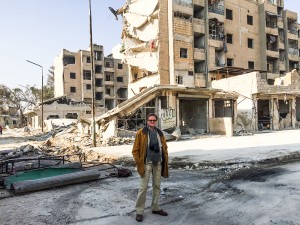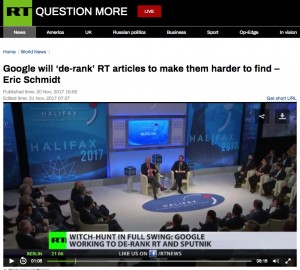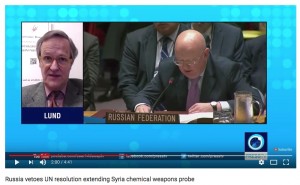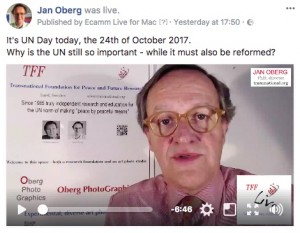Archive for the ‘International law’ Category
TFF PressInfo # 438: Aleppo’s Liberation one year ago – Anybody ashamed today?
By Jan Oberg
December 12, 2017, marks the anniversary of the liberation – the West called it fall – of Aleppo in Syria. What happened is conveniently forgotten today by the West.
Some of us can’t and won’t forget what was both world, regional and local history.
Important for Syria, for the West and for the future world order – for at least 5 reasons.
1. The Western mainstream media’s deceptive – constructed, ignorant, or both – narrative since 2011 was debunked.
Perspectives that media and political decision-makers deliberately omitted (remember omitted stuff is more important than fake):
• History and the colonialists’ role in Syria.
• The immense complexity of the Syrian society.
• Syria as a 7000 year-old civilisation and as end of the Silk Road.
• The decades-long conflicts underlying the violence, since CIA’s coup in 1949.
• The Western-driven regime change policies years since before 2011.
• Other causes of the conflicts than “Assad the dictator and his regime” such as environmental crisis, oil and gas, and its being partly occupied since 1967 by Israel.
• That nothing of the conflict complexity can de facto be reduced to a matter of one man’s role – like it couldn’t with Milosevic (now exonerated), Saddam, or Ghadafi;
• That this may have been a civil war for about a week but then almost 7 years of international aggression by thousands of foreign groups, Western governments/arm suppliers and their Saudi-led allies.
• Syria’s right under such circumstances to self-defence according to Article 51 of the UN Charter.
• The major role in the utter destruction of Syria played by NATO countries, Turkey particularly when it comes to Aleppo, and Western allies such as Saudi Arabia and the Gulf states; all was simply ”the dictator/regime killing his own people”…
• That Russia and Iran was the only foreign powers legitimately present according to international law.
• That the UN was sidelined – again – and tasked with the impossible role of making peace out of such member state policies.
• The media interest in Syria disappeared immediately after Aleppo’s liberation as if orchestrated by one conductor. Silence.
• And Facebook and Google Search changes algorithms…
The media coverage stopped there and then – like musicians under a conductor, obeying the tiniest move.
2. It marked the end of the West’s attempt at regime change since 2012
It had started formally on Dec 12, 2012 – on the day four years earlier, in Marrakesh. “Friends (!) of Syria” declared Assad’s government illegitimate and set up a Syrian National Council – without, of course, asking the Syrian people it was supposed to represent. Here’s AlJazeera’s/AFP’s coverage of that cruel decision.
TFF PressInfo # 436: The Prince of human rights got it all wrong and we are still waiting
By Jan Oberg
General Ratko Mladic has finally been sentenced – to life – for crimes committed in Bosnia during the Yugoslav dissolution wars in the 1990s.
That motivated Prince Zeid Ra’ad Al Hussein, the UN High Commissioner for Human Rights, to make a statement to the effect that “Mladic is the epitome of evil, and the prosecution of Mladic is the epitome of what international justice is all about.”
But that statement is, if anything, the epitome of exemplary nonsense, pro-Muslim bias and something the UN S-G ought to distance himself from since it is a purely political statement.
The media – in the West in particular – have of course lapped it up. Most media people today are too young to have any personal experience of the events some 25 years ago and would have to read thick books to understand some of it.
The verdict’s political effect – whether intended or not – is to justify the horrible way the so-called “international community” intervened in the Yugoslav complex of intertwined conflicts with an inverse proportion between its intellectual understanding and its brutality.
Now, if you think I am thereby defending Mr. Mladic, let me say that there are strong reasons to believe that he is guilty of much including some of the killings in the massacre of Srebrenica.
Essentially, the argument of this article is not about Mladic. It’s about the Zeid Ra’ad Al Hussein’s unacceptably politicized – but hopefully well-intentioned – statement.
But the Jordanian prince – who was with UNPROFOR in Yugoslavia at the time and should know better – anyhow got it all wrong because:
• The human evil card is a cheap one to play that doesn’t explain anything. Any serious intellectual knows that there are very complex economic, political, historical and other factors associated with crimes of this type. What happened in Srebrenica can’t be reduced to one man’s evil as little as the Second World War can be reduced to the single person Hitler.
• What made Srebrenica happen was, among other things, that the six safe zones the UN Security Council had established was never made safe by the UN members. Then UNPROFOR top General Wahlgren of Sweden whom I knew very well had required around 30.000 more UN troops to make those zones safe for refugees to be in; the international community gave him only 1200 Turks with a Turkey firmly sympathising with the fundamentalist Muslim leadership in Bosnia under Alija Izetbegovic.
• Interestingly, the safe zones were not de-militarised. The international community – the US? – had permitted Izetbegovic’s government to place its ammunition depots and troops inside these zones – from which they could then make excursion out and fire into Serbian villages while Serbs obviously could not fire into safe zones filled with refugees.
• In addition, the UN as such was bankrupt at the time – member states such as the US having ignored to pay its dues to the organisation. Read the rest of this entry »
What makes Google’s Eric Schmidt so afraid? And what should he be afraid of?
By Jan Oberg
OK, it’s from Russia Today so you should of course not trust it but somehow this video and text and the man in it seems quite factual, not fake and obviously not omitted.
It documents that Eric Emerson Schmidt, the Executive Chairman of Alphabet – an American multinational conglomerate that owns a lot and among them Google – is working on “de-ranking” alleged propaganda outlets such as Russia Today, RT – the world’s third largest television network – and Sputnik.
Who is Eric Schmidt?
On the Wikipedia link you can read more about Mr. Schmidt, one of the richest person on earth, an advocate of net neutrality, a corporate manager and owner of a lot, a collector of modern art, etc. And you can read about his heavy involvement with Hillary Clinton’s recent campaign and the Obama administration and about Schmidt’s involvement with Pentagon, too.
Eric Emerson Schmidt’s name is associated with the world’s largest and most systematic data collecting search engine, Google, that millions upon millions use. School children, teachers, parents, media people, politicians and you and I all daily “google” what we need to know.
While we do that, Google tracks everything about us and if you are searching for a thing to buy, say a camera, be sure that camera ads will shortly after turn up on your screen. And they know everything we are interested in through our “googling” including political interests and hobbies.
Playing God
This very powerful corporate leader with a open political orientation has decided Read the rest of this entry »
PI 435 Likely: Nuclear Use Within Months (Part 2) – How to avoid it and build peace with Korea?
By Jan Oberg*
Fact is that we are dealing here with a conflict that is the most threatening to humankind’s survival and it would be rather more easy to solve than most other conflicts.
This has recently been pointed out by TFF Board Member and former Co-President of International Physicians for the Prevention of Nuclear War, IPPNW, 2004-2008, Gunnar Westberg, in a short analysis.
How?
• The West – the EU or NATO, if not the US itself – takes a serious mediation initiative. As long as people talk, they don’t start wars. That in itself would de-escalate the tensions and risks in sharp contrast to continued tit-for-tat sandbox thinking and reckless statements, last by defence secretary Mad Dog Mattis at the border between the North and South.
• The vastly superior side stops every military activity in the waters close to the North while South Korea’s leadership take up contact with the leadership of the North.
• The type of provisions of Jimmy Carter’s old deal with the North Koreans are dusted off and used as inspiration for more: Give the North Koreans all the economic assistance they believe they need and give them civilian energy technology too – as a quid-pro-quo for very tight IAEA inspections and a written guarantee that it will not acquire nuclear weapons as long as the West keeps its side of such a deal. (President George W. Bush just destroyed that deal and thought it appropriate to include North Korea in his Axis Of Evil speech).
• Sign a non-aggression or non-attack pact between North and South Korea and between North Korea and the US. That is, undermine any fears the North Koreans may have. The overwhelming superiority of the adversaries of the North implies that such a pact would be risk-free to write and sign.
• Let North and South Korea freely decide if they want to unify. They have a perfect human and international legal right to do so, it’s nobody’s business but the Korean people’s. The world should assist them in doing so if they want.
• The US and North Korea sign a peace treaty (what exists today is only the 1953 ceasefire agreement). Read the rest of this entry »
The One and Only Path to Palestine/Israel Sustainable Peace
By Richard Falk
Prefatory Note
This post is a slightly modified version of my presentation to the Human Rights Commission of the Italian Parliament on October 11, 2017. The Commission is composed of members of Parliament and chaired by Hon. Pia Elda Locatelli, representing the city of Bergamo. The presentation was followed by a discussion, and a generally favourable response on the central issue of switching from an emphasis on ‘occupation’ to ‘apartheid.’
An Overview of Present Realities
We meet at a difficult time from the perspective of the Palestinian people: several developments nationally, regionally, and internationally now deprive Palestinians of that glimmer of hope that comes from seeing light at the end of the tunnel; more fully appraised, the situation is not as bleak for Palestinians as the picture of their struggle being painted from a realistic perspective.
A series of factors pointing in both directions can be identified, first to highlight the negative developments from a Palestinian perspective, and then to set forth several developments that are positive with regard to the Palestinian national movement aiming for decades to achieve a just and sustainable peace.
(1) The foreign policy priorities of regional and international political actors have increasingly shifted attention away from the Palestinian ordeal; developments internal to Israel have deliberately accentuated this inattention to Palestinian goals and rights; of special relevance in these regards are the ongoing wars and turmoil in Syria, Yemen, Libya, and Iraq, as well as deteriorating relations and rising tensions of the Iran/US relationship.
Further, there are the moves toward normalization of relations with Israel by the Gulf countries, especially Saudi Arabia; and the unsteady diplomatic approach of the Trump presidency that seems accurately interpreted as supportive of whatever the Israeli government chooses to do, including even accelerated settlement expansion and a rejection of the Palestinian right of self-determination.
(2) Israel and Zionist support groups have launched a variety of initiatives designed to convince the Palestinians that they have been defeated, that their struggle is essentially futile at this stage, and they should move on for their own sake, overtly renouncing their struggle and posture of resistance.
The pro-Zionist Middle East Forum, founded by Daniel Pipes has even sponsored a so-called ‘victory caucus’ that basically proclaims an Israeli victory as a way of demoralizing Palestinian activism and global solidarity efforts by treating Palestinian goals as a lost cause. Read the rest of this entry »
Impact of European common values on the EU’s ability to solve conflicts in the countries of the Eastern Partnership
By Per Gahrton
Former Member of the European Parliament, Green Party of Sweden
PhD Sociology
Lund, Sweden, October 2017
A lecture at the XI Congress of Ukrainian European Studies Association, Kharkiv National University, October 20, 2017
Introduction: Sweden-Ukraine ties
A couple of days ago Swedish media reported that a wild boar, shot some 200 kilometres north of Stockholm, had been found to contain ten times more radioactivity than permitted by the health authorities. As you may guess, this radioactivity emanated from the Tjernobyl nuclear disaster in 1986. This shows that we live in one globalized world and that my Sweden and your Ukraine are linked together.
Another example of Swedish-Ukrainian common experience might be the battle of Poltava in June 1709, which according to Wikipedia resulted in the “beginning of Sweden’s decline as a Great Power”. As belligerents, Wikipedia lists on one side Sweden and Ukraine, on the other Russia.
However, this military defeat against the Tsar may have been a blessing for the Swedes, because afterwards the Swedish people toppled the dictatorship of the king and introduced what is called The Times of Freedom (Frihetstiden), when a four-chamber parliament including peasants, ruled the country for half a century. Though it was not a full-fledged democracy (women and the poorest men were excluded) it was a starting point, well before the French Revolution.
About hundred years later Sweden suffered another defeat against Russia, which in 1809 conquered Finland, a country that until then had been an integral part of the Swedish kingdom.
Although many Swedes wanted to retake Finland, today most historians think that perhaps even this defeat was a blessing, for two reasons: First, the inevitable Finnish struggle for independence – which celebrates its 100th anniversary this year – was not conducted against Sweden but against Russia. And secondly, the political elite decided, as expressed by the famous poet Esaias Tegnér, to “reconquer Finland inside the borders of Sweden” which meant to build a peaceful and rich society and give up wars and dreams of territorial expansion and great power status.
Since then Sweden has been militarily non-aligned and has seen no war for more than 200 years.
Examples of Scandinavian conflict-resolution
However, earlier throughout history Scandinavia has been an arena for endless internal wars, mainly between the Danish and Swedish kingdoms. Like so often people have fought with those who should be their closest friends – their neighbours. Read the rest of this entry »
Establish an International Tribunal or Commission on the International War In Syria
It’s time – long ago – to establish an International Tribunal/Commission on the Entire International War In Syria.
Jan Oberg Comment
You should be sick and tired of blame game around selected events and misuse of international law in Syria. I am!
Process instead the entire war and give justice and reconciliation to the Syrian people who have suffered incredibly.
Why is the UN still so important – while it must also be reformed?
By Jan Oberg
Why is the UN still so important – in spite of having had its Charter violated repeatedly during the last 25 years?
Why should we not – cynically – side with the cynical and powerful countries that want to undermine and marginalise the world’s finest organisation with the most Gandhian-like document ever signed by governments?
What is the real UN and what does its Charter really say?
Jan Oberg tries to cover some of the answers in this 6 min video produced as Facebook Live on October 24, 2017.
Europe Should Stop Trump from Starting Another War in the Middle East
By Farhang Jahanpour*
As was expected, President Trump has decertified Iran’s compliance with the nuclear deal or, to give it its full name, the Joint Comprehensive Plan of Action (JCPOA), despite the fact that he certified it twice before. As recently as 14 September 2017, Trump also waived certain sanctions against Iran as required under the terms of the deal.
Yet, in an extremely belligerent and hostile speech, he put out his new policy towards Iran.
The certification of the deal is not part of the agreement, but as anti-Iranian hawks in both parties wanted to undermine President Barrack Obama and create obstacles on the path of the deal they required the president to recertify every 90 days that Iran was still in compliance with the provisions of the deal. That certification has no international validity.
Trump provided a long list of contentious issues about Iran’s alleged malign influences in the region and her presumed violation of the JCPOA, while totally ignoring America’s long record of unilateral wars and war crimes and initial support for terrorist groups, such as Al Qaeda, the Taliban and other terrorist groups in the Middle East and beyond.
By law, Congress has 60 days to reimpose sanctions on Iran, which would violate the provisions of the JCPOA, or leave matters as they are. Given the predominance of hawks in Congress, it is likely that they will follow Trump’s lead and will try to kill the deal.
During the campaign, Trump often criticized the deal as the worst agreement in history and promised that he would tear it up. In his inaugural address to the UN General Assembly, Trump proclaimed that the Iran deal “was one of the worst and most one-sided transactions the United States had ever entered into,” even declaring it “an embarrassment to the United States.” He ominously warned that the world had not “heard the last of it, believe me.”
Now, by decertifying Iran’s compliance with the deal, Trump has lived up to his hyperbolic rhetoric about the agreement that was regarded as one of the most remarkable diplomatic achievements since the end of the Cold War. Read the rest of this entry »







